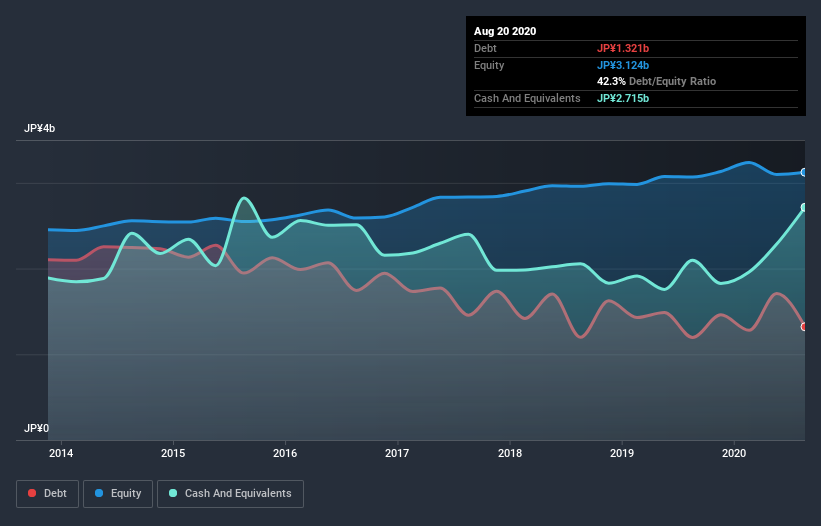- Japan
- /
- Commercial Services
- /
- TSE:3035
These 4 Measures Indicate That ktk (TYO:3035) Is Using Debt Safely

Some say volatility, rather than debt, is the best way to think about risk as an investor, but Warren Buffett famously said that 'Volatility is far from synonymous with risk.' So it seems the smart money knows that debt - which is usually involved in bankruptcies - is a very important factor, when you assess how risky a company is. Importantly, ktk Inc. (TYO:3035) does carry debt. But is this debt a concern to shareholders?
What Risk Does Debt Bring?
Generally speaking, debt only becomes a real problem when a company can't easily pay it off, either by raising capital or with its own cash flow. If things get really bad, the lenders can take control of the business. However, a more common (but still painful) scenario is that it has to raise new equity capital at a low price, thus permanently diluting shareholders. Having said that, the most common situation is where a company manages its debt reasonably well - and to its own advantage. When we think about a company's use of debt, we first look at cash and debt together.
View our latest analysis for ktk
How Much Debt Does ktk Carry?
As you can see below, at the end of August 2020, ktk had JP¥1.32b of debt, up from JP¥1.20b a year ago. Click the image for more detail. But it also has JP¥2.72b in cash to offset that, meaning it has JP¥1.40b net cash.

A Look At ktk's Liabilities
We can see from the most recent balance sheet that ktk had liabilities of JP¥4.71b falling due within a year, and liabilities of JP¥618.0m due beyond that. On the other hand, it had cash of JP¥2.72b and JP¥2.35b worth of receivables due within a year. So its liabilities outweigh the sum of its cash and (near-term) receivables by JP¥263.0m.
Since publicly traded ktk shares are worth a total of JP¥1.66b, it seems unlikely that this level of liabilities would be a major threat. However, we do think it is worth keeping an eye on its balance sheet strength, as it may change over time. While it does have liabilities worth noting, ktk also has more cash than debt, so we're pretty confident it can manage its debt safely.
Also good is that ktk grew its EBIT at 11% over the last year, further increasing its ability to manage debt. When analysing debt levels, the balance sheet is the obvious place to start. But it is ktk's earnings that will influence how the balance sheet holds up in the future. So when considering debt, it's definitely worth looking at the earnings trend. Click here for an interactive snapshot.
Finally, a business needs free cash flow to pay off debt; accounting profits just don't cut it. ktk may have net cash on the balance sheet, but it is still interesting to look at how well the business converts its earnings before interest and tax (EBIT) to free cash flow, because that will influence both its need for, and its capacity to manage debt. During the last three years, ktk produced sturdy free cash flow equating to 80% of its EBIT, about what we'd expect. This cold hard cash means it can reduce its debt when it wants to.
Summing up
Although ktk's balance sheet isn't particularly strong, due to the total liabilities, it is clearly positive to see that it has net cash of JP¥1.40b. And it impressed us with free cash flow of JP¥505m, being 80% of its EBIT. So is ktk's debt a risk? It doesn't seem so to us. When analysing debt levels, the balance sheet is the obvious place to start. But ultimately, every company can contain risks that exist outside of the balance sheet. Consider for instance, the ever-present spectre of investment risk. We've identified 4 warning signs with ktk , and understanding them should be part of your investment process.
At the end of the day, it's often better to focus on companies that are free from net debt. You can access our special list of such companies (all with a track record of profit growth). It's free.
When trading ktk or any other investment, use the platform considered by many to be the Professional's Gateway to the Worlds Market, Interactive Brokers. You get the lowest-cost* trading on stocks, options, futures, forex, bonds and funds worldwide from a single integrated account. Promoted
New: Manage All Your Stock Portfolios in One Place
We've created the ultimate portfolio companion for stock investors, and it's free.
• Connect an unlimited number of Portfolios and see your total in one currency
• Be alerted to new Warning Signs or Risks via email or mobile
• Track the Fair Value of your stocks
This article by Simply Wall St is general in nature. It does not constitute a recommendation to buy or sell any stock, and does not take account of your objectives, or your financial situation. We aim to bring you long-term focused analysis driven by fundamental data. Note that our analysis may not factor in the latest price-sensitive company announcements or qualitative material. Simply Wall St has no position in any stocks mentioned.
*Interactive Brokers Rated Lowest Cost Broker by StockBrokers.com Annual Online Review 2020
Have feedback on this article? Concerned about the content? Get in touch with us directly. Alternatively, email editorial-team@simplywallst.com.
About TSE:3035
ktk
Manufactures and sells recycled products and office supplies for use in office automation equipment in Japan.
Flawless balance sheet average dividend payer.
Market Insights
Community Narratives



